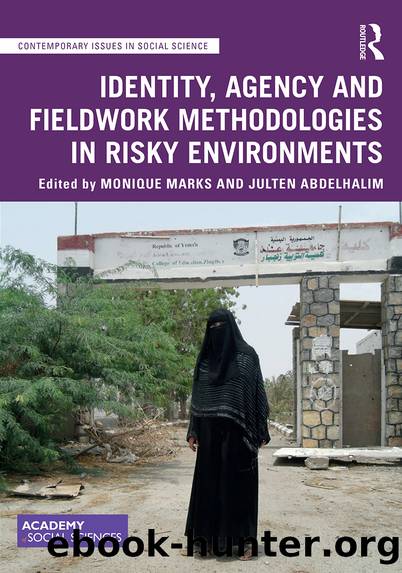Identity, Agency and Fieldwork Methodologies in Risky Environments by Monique Marks Julten Abdelhalim

Author:Monique Marks, Julten Abdelhalim [Monique Marks, Julten Abdelhalim]
Language: eng
Format: epub
ISBN: 9781032085463
Barnesnoble:
Publisher: Taylor & Francis
Published: 2021-06-30T00:00:00+00:00
Risk factor 3: ethics in the shadows
The lost sense of ethics in recent partnerships has led to personal and scientific risks, including participantsâ concerns about their own and the researcherâs safety. Participants were often very vulnerable, without structural and moral support from the UNAD after the end of the partnerships with Denmark and ADD-UK (Action on Disability and Development, which collaborated on societal inclusion and advocacy with ADD-Uganda from 1996 to 2003 in Northern Uganda, and from 2001 to 2010 in other districts6). From a community perspective, this can be illustrated by the participant who addressed potential future donors in our project film A fruitful future? A video snapshot of the Ugandan deaf community (Kyambogo University, 2015). These members have few opportunities for âvoiceâ, both inside and outside the community, and the video illuminates a form of research ownership.
This sense of ownership is also present in the sometimes explicit request of participants to have their (full) story written in the book that we are writing, titled Developing sustainably? The Ugandan deaf community looking back and forward (Lutalo-Kiingi & De Clerck, in press), alongside their desire for us to avoid writing about and/or completely anonymise certain contents. We try to respect and adequately deal with these requests, and tell the communityâs story, while also protecting them through the selection of contents, balancing identified and anonymous information, and compiling data from different regions.
The risks for participants are similar to those connected with the politics and power hierarchies of the development context; these include exclusion and social isolation, stigmatisation, unemployment and poverty. Taking into account the social position of deaf Ugandans, for whom the deaf community is often an extended family, these risks are especially acute. The way information is shared reveals that deaf Ugandans have also become skilled in this ritual dance. It was particularly confronting when participants warned the Ugandan researcher during the interview that he had to be very careful, and described the threats to life and limb that they had experienced. In Uganda, these threats to oneâs safety, reputation and livelihood are commonly known as âfollowingâ and âpoisoningâ. In the meantime, the researcher also received concerns from Ugandan development partners about the resistance they encountered when requesting that all stakeholders, including the university, become involved in UgSL projects, as in the long-term partnerships.
The researchers have an ethical responsibility to deal with requests from participants who are HIV+ and want to tell their story for the sake of social change, for example, ending prostitution among young members. They are aware of the risks of stigmatisation; however, it is important that they receive support to access services and deal with the risks involved for their families. There is also an ethical responsibility in protecting the dignity of those who shared stories of poverty, war, familial exclusion, marriage issues, youth offending, abuse, exploitation and illness.
Common concerns of participants were that they wanted to understand what was going on, be informed of projects, and have opportunities to be involved. Our workshop, exhibition and
Download
This site does not store any files on its server. We only index and link to content provided by other sites. Please contact the content providers to delete copyright contents if any and email us, we'll remove relevant links or contents immediately.
Through Windows of Opportunity : A Neuroaffective Approach to Child Psychotherapy by Marianne Bentzen; Susan Hart(942)
Overcoming ADHD Without Medication : A Guidebook for Parents and Teachers by Children and Natural Psychology Association for Youth; Children The Association for Youth(880)
Out of the Mainstream: Helping the Children of Parents with a Mental Illness by Loshak Rosemary;(876)
Delphi Collected Works of Sigmund Freud (Illustrated) by Sigmund Freud(644)
The Noom Mindset by Noom(589)
The 48 Laws of Mental Power: Overcoming Trauma and Building Mental Strength by Victor O. Carl(548)
The Psychology of Media and Politics by George Comstock & Erica Scharrer(475)
Sigmund Freud by Janet Sayers;(471)
MANIPULATION & MIND CONTROL: The Persuasion Collection: Dark Psychology Secrets, Analyze & Influence People with Nlp. How to learn Reading Friends and Develop Body Language Skills. by ROBERT TOWER(457)
Behold the Monster by Jillian Lauren(436)
It's nobody's fault: new hope and help for difficult children and their parents by Harold Koplewicz(435)
Totem and Taboo: Some Points of Agreement between the Mental Lives of Savages and Neurotics by Sigmund Freud(423)
The Hypnotic Coach: A Conversational Hypnotherapy Tool Kit by Marion Jess(420)
Directions in Technical Writing and Communication by Gould Jay R.;(411)
Mastering Flow: Perform Better, Experience More Joy, and Live a Happier Life by Nils Salzgeber(403)
THE PSYCHOLOGY OF ENTREPRENEURSHIP; New Perspectives by Michael M. Gielnik; Melissa S. Cardon; Michael Frese(383)
Positive Psychology Across the Lifespan; An Existential Perspective by Piers Worth(363)
Mind Hacking Secrets and Unlimited Memory Power: 2 Books in 1: Learn How to Improve Your Memory & Develop Fast, Clear Thinking in 2 Weeks + 42 Brain Training Techniques & Memory Improvement Exercises by Sharp Scott(357)
The Modern Young Man's Guide to Manhood by Wayne Walker(355)
